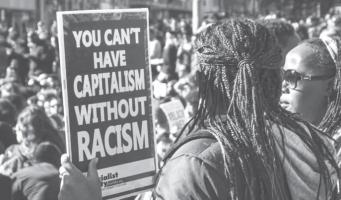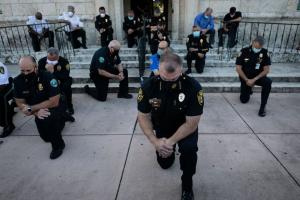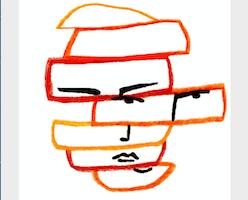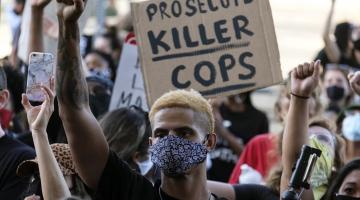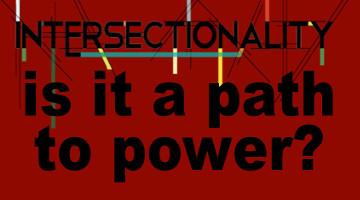In this series, we ask acclaimed authors to answer five questions about their book. This week’s featured author is Biko Mandela Gray. Gray is Assistant Professor of Religion at Syracuse University. His book is Black Life Matter: Blackness, Religion, and the Subject.
Roberto Sirvent: How can your book help BAR readers understand the current political and social climate?
Biko Mandela Gray: I hope readers of Black Life Matter will recognize that the current political order is irredeemably antiblack—that police killings are not, in any way, extraordinary, in large part because this is what police are tasked with doing. When police kill black people, they are just doing their jobs. And in doing their jobs, they justify themselves (and the host of people who call upon them) as good and normative subjects who protect the established order.
But Black Life Matter isn’t only about the police. Neither is it simply about what we would call “racial justice.” The thrust of the text is ethical; there is something about the way these killings go down, and the way that the antiblack world justifies them, that says something about who one is and can be—about what options are (not) available, about how the normative subject’s life is constituted in and through black death. In my mind, that is not simply a question of justice, or politics. It is a question of ethics, of how one lives and how one might live. Black Life Matter argues that, in an antiblack world, how normative subjects (might) live is only made possible through antiblackness. And the goal, therefore, is to push toward other ethical frames that might afford different possibilities.
This ethical question is structured by religious logics. How one might live, at least in the antiblack West, is always structured by Christian philosophical and theological logics that overdetermine the meaning of life. Black Life Matter explores these religious logics through the lives that were stolen from us. From the exploration of theodicy in the first chapter, to the discussions of ontotheology and interpellation in the second chapter, to the discussion of religious experience in the third, my goal in this text was to show how the phrase “all cops aren’t bad” is a form of religious apologetics. I don’t say it this way in the text, but I hope that comes through.
What do you hope activists and community organizers will take away from reading your book?
I hope that community organizers find both solace and language in this text. While the text is deeply painful—and some might think it is afropessimist—it also gestures toward our capacity to care in the midst of such violence. I’m not saying care will transform the world—and neither do I say this in the book—but I do think that there is something to be said in the relationships that are formed in the midst of organizing, of the love that can be cultivated as one plans a direct action, protest, or approaches the negotiating table. In the third chapter, I briefly discuss my experiences with organizers in Waller and Houston, Texas, after Sandra Bland died. After we got news that Bland had died, we found ways to love and care for her—and each other. Those relationships remain. They endure. We find solace in one another as we do our work. That care, that solace, matters. For me, anyway.
But it isn’t simply our relationships with the living that are changed. In the first and second chapters, I underscore how these organizing efforts remind us that the dead still speak, and we can hear them if we only listen. I speak to this indirectly in the first chapter, and then more directly in the second chapter, where I sit with Ieshia Evans, a woman who did not know Alton Sterling but was nevertheless moved—compelled—to go and protest for him. There is something about the way we organize, the way we move, the way we think collectively, that allows for a different kind of sociality, a different kind of relationality, to develop.
We know readers will learn a lot from your book, but what do you hope readers will un-learn? In other words, is there a particular ideology you’re hoping to dismantle?
There are a few, honestly, but I’ll focus on two! The first one—and I’m not alone in saying this—is the notion of “the black body” and all its attendant significations. I’m struck by how we use the term “body,” how that term has a pernicious philosophical heritage, and how that very term is what justifies the death of someone like Tamir Rice, for example. The first chapter explores this in detail: drawing from Saidiya Hartman, I claim that the “black body” (and perhaps this is different from what thinkers like Zakiyyah Jackson calls the “organismic body”) is a curse. To become a body, to be reduced to one’s body, to be “corporeally maledicted,” as Hartman might say, is to become mere material for the fulfillment of others’ projects. I think we must discard—or at least displace—the body as conceptual terrain in favor of what so many of us have called flesh.
Second, and perhaps most important, I want to completely destroy any claims that these officers were wayward, that they are unique. In other words, I want to completely eradicate any “bad apples” nonsense. That’s not how cops work. Police kill black people because that’s their charge, their task, their vocation. Black Life Matter is clear about this: State-sanctioned antiblack violence isn’t the result of “corruption” or aberrant police officers. Joseph Weekley, Timothy Loehmann, Blane Salamoni, and Brian Encinia—and for that matter, Derek Chauvin and the officers who killed Breonna Taylor and Tyre Nichols—were just doing their jobs. To think otherwise is folly. Black Life Matter seeks to expose this folly, to underscore how normal—and encouraged—it is for cops to kill black people.
Which intellectuals and/or intellectual movements most inspire your work?
I am trained as a philosopher of religion who specializes in phenomenological and ethical analysis, so I’m heavily influenced by the phenomenological tradition—from Husserl to Merleau-Ponty and Levinas. (I would also include Frantz Fanon here, but it seems he’s primarily read as a psychiatrist.) But phenomenology is just a methodological ground that I till. As a philosopher of religion, I’m deeply influenced and inspired by William R. Jones’s work. He once wrote a text called Is God a White Racist, and while I do not explicitly engage him in this text, he can be felt throughout the pages. (He, too, engaged phenomenology, by the way—albeit with an existentialist twist.) I’m also, of course, influenced and inspired by classical thinkers in black religious studies: Charles Long, Katie Cannon, Anthony Pinn, and Victor Anderson remain some of the most formative influences on my thinking.
Beyond my training in my field, I’m deeply inspired by the work of Christina Sharpe. In the Wake has become a kind of sacred text for me—in fact, in some ways, I see Black Life Matter as my way of thinking with Sharpe. More recently, I’ve found myself really in awe of Rinaldo Walcott’s brilliance; The Long Emancipation gives me so much to think with as a philosopher of religion. I’m also inspired by thinkers in Black studies who remind me that things are still possible: people like Ashon Crawley, Fred Moten, Saidiya Hartman, Marquis Bey, and Kevin Quashie call (to) me in ways I cannot describe—both in the style and content of their writing.
Lastly, it might seem odd to say, given what I’ve just said, but I’m also deeply influenced by the afro-pessimist/black nihilist tradition. I do not claim to be one, but Jared Sexton’s sophistication, Frank Wilderson’s passion, and Calvin Warren’s unflinching brilliance and creativity are, for me, powerful to think with. Even if I do not identify as an AP, I am moved by their analyses, by the way they think and prophetically call us out of our own dogmatic slumbers regarding (anti-)blackness.
Which two books published in the last five years would you recommend to BAR readers? How do you envision engaging these titles in your future work?
I’ve already mentioned one—namely, Rinaldo Walcott’s The Long Emancipation. Recently, I’ve started working on a book on ethics by sitting with Sojourner Truth, and Walcott’s notion of “black life forms” gives me language for how discussing who Truth was and might still be. I want to theorize ethics through Truth in this text, and The Long Emancipation will undoubtedly be one of the theoretical foundations for that project, as it calls us to interrogate what freedom might be. I’m thinking of this interrogation in and through the ways Sojourner showed up in the world—the ways that she moved that felt free, even if she was only emancipated. What Walcott does in The Long Emancipation is nothing short of amazing, and I want to continue to stew in his words and thoughts—and think about what it might mean for ethics.
And I should say that I’m just a few pages in, but Bettina Judd’s Feelin’ is giving me life. Judd’s prose is as gorgeous as her critiques and theorizations are profound. I’ve been thinking with “the delirium of a felt life,” thinking about how feelin’ takes us back to our flesh, calls us to turn away from the needlessly abstract (and deceptively metaphysical) work of affect studies and back to the felt engagements of and in black life, black lives. Judd does this through the lives of black women artists, but I’m looking at Sojourner Truth and wondering about that delirium, about the ways that a “felt life” might also show itself in abolitionist feminists. Feelin’ is a work of creative nonfiction scholarship; its prose reminds me what’s possible in a work. As I turn my attention to my next project, I need to be reminded that, as Steve Biko once said, I can “write what I like.” Feelin’ reminds me of this, and, in a way, gives me permission to do it.
Roberto Sirvent is editor of the Black Agenda Report Book Forum.

